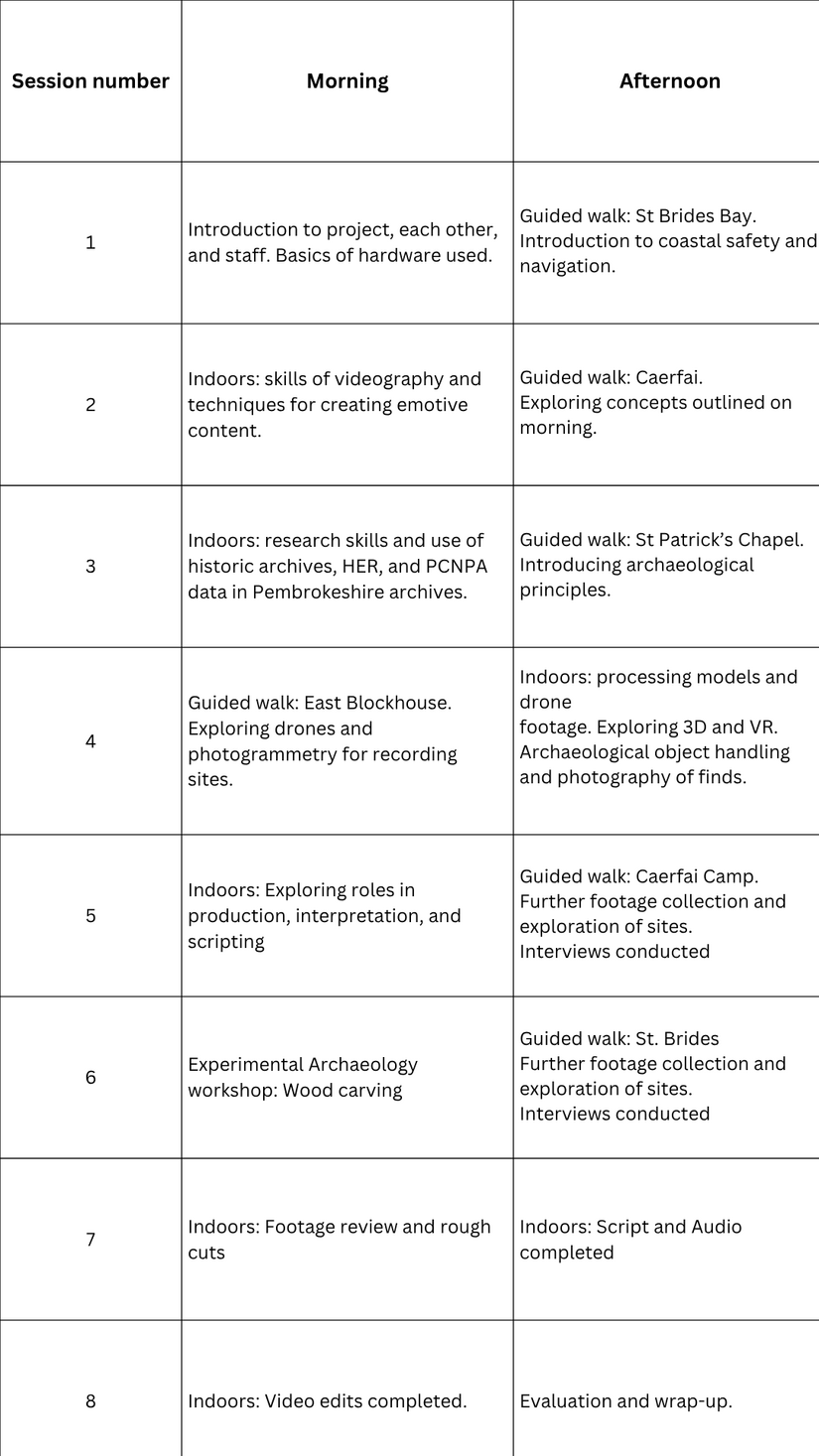Communicating Climate Risk and Heritage Loss / Cyfathrebu Risg Hinsawdd a Cholled Treftadaeth
Project title: Tough Decisions: Communicating Climate Risk and Heritage Loss / Penderfyniadau Anodd: Cyfathrebu Risg Hinsawdd a Cholled Treftadaeth
IAA project type: Partnership grant
Duration of project: January - June 2025
Partner organisation: Pembrokeshire Coast National Park Authority (PCNPA), Futureworks (Pembrokeshire County Council)
MOLA staff leading IAA project: Kit Ackland
Project aims
This project aimed to:
- Raise awareness of decision-making processes and consequences of heritage loss.
- Allow young people to explore their relationship with the coastline, their community, and their sense of identity through heritage.
- Provide beneficiaries with transferrable skills for career development.
- Generate a knowledge exchange between the partners and create a legacy for continued outreach within the community in the future.
- Test a new methodology for engaging with hard to reach audiences for future events with Coasts in Mind project.
Audiences
Collaborating with Futureworks, the participants in this project included those who have had difficulty within the education system, have additional learning needs, or come from lower-income backgrounds. Many wanted to develop their communication and social skills.
This project provided the young people with the opportunity to explore the coastline, a sight which some of them may have never seen, providing them with an overview of why cultural heritage is important and why managers may want to protect or leave certain sites. For some this was also be their first experience of Welsh language outside of school.
The project also gave them the opportunity to express themselves and their identity, and to learn new transferrable skills including research, writing, planning, videography, 3D modelling, public speaking, and project design and delivery. It aimed to empower the participants to continue developing those skills and carry them forward into their future careers and reinforce the understanding that heritage can benefit everyone.
Project plan
The project followed a theme of ‘acceptable heritage loss’, exploring alternate ways of preserving and presenting heritage. Participants aged 16-20 developed knowledge and understanding of coastal heritage and decision making, research skills, and videography and digital recording skills through workshops and guided walks. Guided through a process of creating videographic outputs they demonstrated what they learned and experienced working alongside MOLA and PCNPA.
Four case study areas provided a variety of archaeological examples for discussion of differences in the approach to their preservation and presentation:
- Caerfai Camp, St Davids
- St Brides
- East Blockhouse, West Angle
- St Patrick’s Chapel, Whitesands
8 day-long workshops took place over a 6 month period between January and June 2025.

A further workshop was conducted to finish short videos where some participants were interviewed and assessed on knowledge leading to a qualification in film making from Agored Cymru.
Project outputs
- Workshop and guided site visits with ENL / ESL, non-coastal and non-heritage focused young adult groups.
- Bilingual videographic content produced by participants combining cinematic and vlog-style elements to create a narrative exploring the concept of ‘heritage loss’ and its impact on community and individual identity.
- Conference presentation showing video outputs at PCNPA Archaeology Day. Posters in public spaces advertising the project available on MOLA and PCNPA websites, maintaining legacy after launch.
Watch the first video about the project below, and follow the link to access all videos with both English and Welsh subtitles.
Project outcomes
- PCNPA gained new outreach resources, community connections and understanding of how young people interact with them and the coastline.
- Discourse surrounding heritage loss was opened up with the ‘next generation’, laying foundations for further discussion of direction of heritage policy and what young people need from heritage outreach providers.
- MOLA tested creative, impactful ways to work with community groups and publicly generated content.
- Young adults developed communication and transferable skills for transition to adult life, exploring opportunities they would not otherwise have access to.